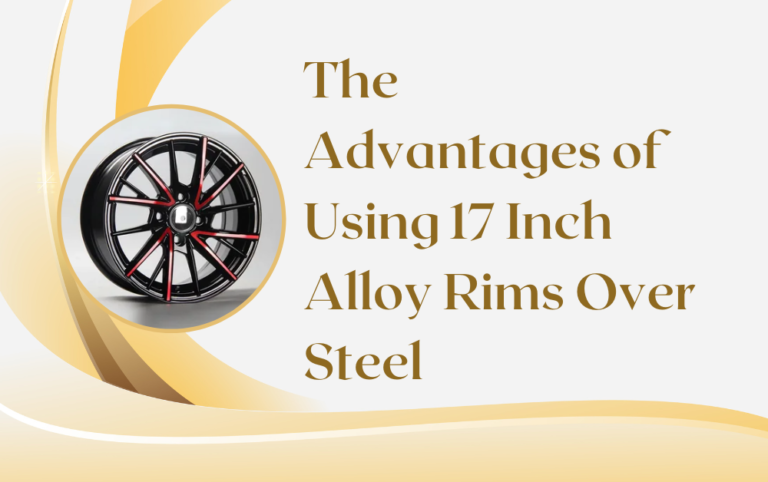
When it comes to upgrading your vehicle, one of the best investments you can make is choosing the right rims. Many drivers are faced with the choice between alloy rims and steel rims. In this blog, we will explore the advantages of using 17-inch alloy rims over steel. We will break down the benefits, making it easy for everyone to understand.
Understanding Alloy Rims and Steel Rims
Before diving into the advantages, it’s important to understand what alloy rims and steel rims are.
What Are Alloy Rims?
Alloy rims are made from a combination of metals, primarily aluminum and other materials. This mixture creates a lightweight and strong rim. Alloy rims are known for their stylish designs and can enhance the appearance of any vehicle.
What Are Steel Rims?
Steel rims, on the other hand, are made from a single piece of steel. They are heavier and typically less attractive than alloy rims. Steel rims are often used in economy cars and trucks due to their durability and lower cost.
Note – Ready to elevate your ride with the perfect set of 17 inch alloy rims? Visit Big Bull today to explore our wide selection and find the ideal rims that combine style, performance, and durability. Don’t settle for less—upgrade your vehicle with Big Bull’s premium alloy rims and experience the difference!
Key Advantages of 17 Inch Alloy Rims
1. Lightweight Design
One of the most significant advantages of 17-inch alloy rims is their lightweight nature.
How Does This Help?
- Improved Performance: Lighter rims reduce the overall weight of your vehicle, which can lead to better acceleration and handling.
- Better Fuel Efficiency: With less weight, your engine does not have to work as hard, which can improve your fuel economy.
2. Stylish Appearance

Alloy rims come in a variety of designs, finishes, and colors.
Why Does This Matter?
- Enhanced Aesthetics: Alloy rims can give your vehicle a sporty and modern look.
- Customization: You can choose rims that match your personal style, making your car stand out from the crowd.
3. Superior Heat Dissipation
Alloy rims are designed to dissipate heat more effectively than steel rims.
What Are the Benefits?
- Better Braking Performance: When driving, brakes can generate a lot of heat. Alloy rims help cool down the brakes, leading to more consistent and reliable braking.
- Reduced Risk of Brake Fade: With better heat management, you are less likely to experience brake fade, which can occur during prolonged braking.
4. Enhanced Ride Quality
The design of alloy rims contributes to a better ride quality.
How Does This Work?
- Flexibility: Alloy rims can absorb some of the shocks from the road, resulting in a smoother ride.
- Better Handling: Improved handling makes driving more enjoyable, especially on winding roads or in challenging weather conditions.
5. Corrosion Resistance
Alloy rims, especially those that are painted or coated, offer better resistance to rust and corrosion compared to steel rims.
Why Is This Important?
- Longevity: Corrosion can weaken steel rims over time. Alloy rims tend to last longer, saving you money in the long run.
- Less Maintenance: With better resistance to the elements, you will spend less time worrying about upkeep and maintenance.
6. Improved Resale Value
Investing in alloy rims can enhance the resale value of your vehicle.
How Does This Benefit You?
- Attracts Buyers: Many buyers prefer vehicles with alloy rims. This preference can make your car more appealing on the market.
- Recoup Costs: While alloy rims may have a higher initial cost, their benefits can help you recoup that cost when you sell your vehicle.
Considerations When Choosing 17 Inch Alloy Rims
1. Compatibility with Your Vehicle
Before purchasing alloy rims, ensure they are compatible with your vehicle.
How to Check?
- Bolt Pattern: Make sure the bolt pattern matches your car’s specifications.
- Offset and Backspacing: These measurements can affect how the rims fit on your vehicle. Consult with a professional if you are unsure.
2. Price Point
Alloy rims can be more expensive than steel rims.
What to Keep in Mind?
- Quality vs. Cost: While alloy rims are pricier, consider the long-term benefits they provide, such as durability and performance.
- Budget Options: There are various options available at different price points, so do some research to find the right fit for your budget.
3. Maintenance Requirements
While alloy rims require less maintenance than steel, they still need care.
What Should You Do?
- Regular Cleaning: Use mild soap and water to clean your alloy rims regularly.
- Avoid Harsh Chemicals: Steer clear of products that can damage the finish of your rims.
Conclusion
Choosing the right rims for your vehicle is an important decision that can impact performance, appearance, and overall driving experience.
Why Choose 17 Inch Alloy Rims?
The advantages of using 17-inch alloy rims over steel rims are clear. They offer a lightweight design, stylish appearance, superior heat dissipation, enhanced ride quality, corrosion resistance, and improved resale value. While they may come at a higher price point, the benefits you gain can outweigh the initial investment.
If you’re considering an upgrade, 17-inch alloy rims are a fantastic choice that can enhance your vehicle in many ways. So, whether you’re aiming for better performance, a sleek look, or durability, alloy rims may just be the perfect fit for you.
Remember, always consult with professionals when making changes to your vehicle. This way, you can ensure the best results and enjoy the advantages of your new rims for years to come.
For more insightful articles related to this topic, feel free to visit coknews.com